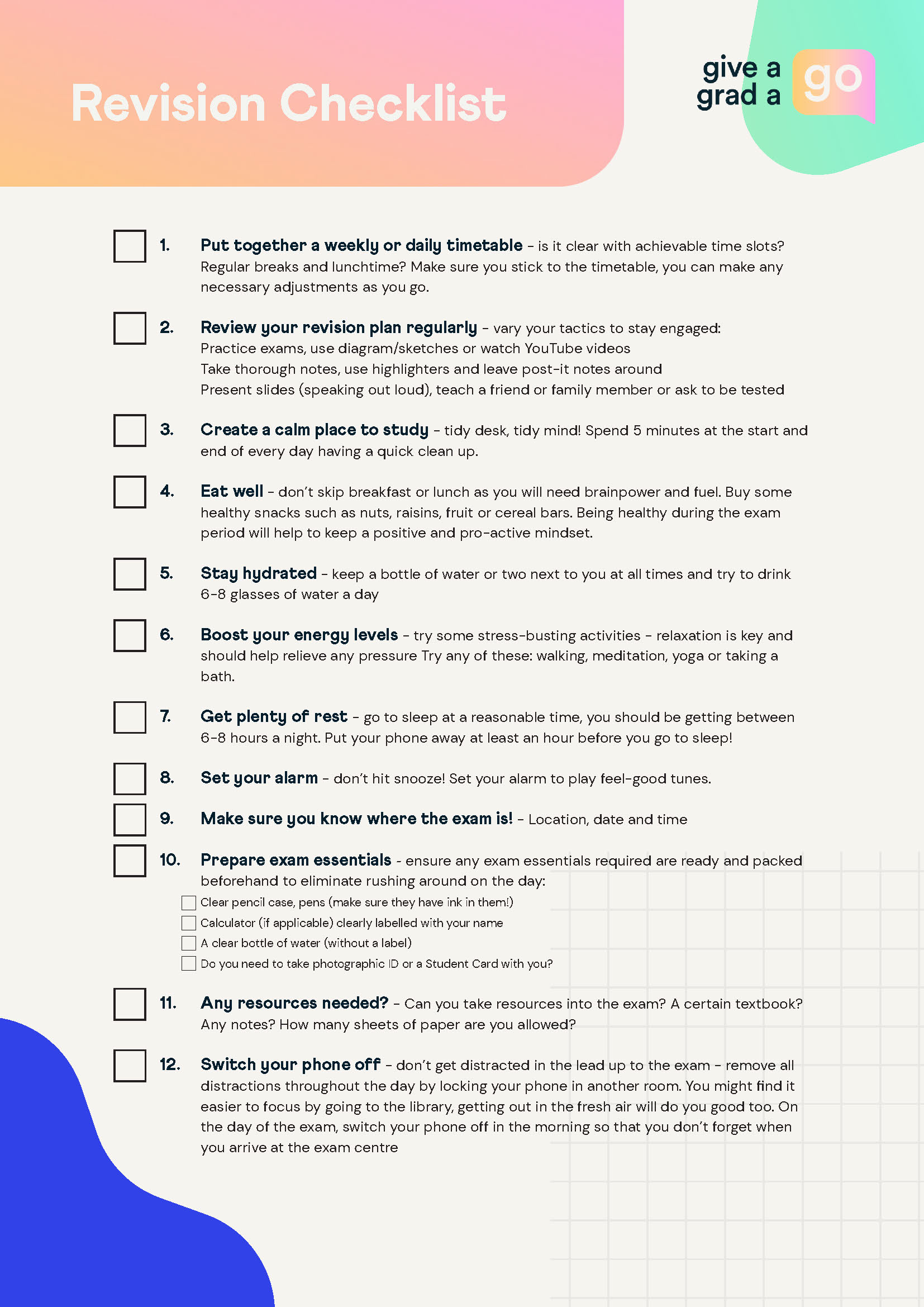Whilst at University, the Easter holidays can be a relief, taking a break to indulge in piles of chocolate and enjoying a much-needed stint of home-cooked meals.
Often though, this recess offers the chance to dig into some crucial revision with final exams just around the corner.
Not sure where to begin?
We’ve put together a revision checklist template to help keep you on a steady revision route – helping you overcome post-lunchtime slumps, right through to the morning of your exam.

Revision Checklist
1. Put together a weekly or daily timetable
- Is it clear and concise with achievable time slots?
- Have you included regular breaks and a lunchtime?
- Make sure you stick to the timetable from the get-go
- If you start trailing off, revisit the timetable and make any necessary adjustments as you go.
2. Review your revision plan regularly
- Do you need to change anything?
- Vary your tactics to stay invigorated and engaged
- Practice exams! Check if you can retrieve any from the library or online and time yourself to see how long it will take you. What sort of questions are there? E.g. short, essay or multiple choice
- Diagrams /sketches – stimulate the brain with colourful images. A more visual approach to your revision will keep facts or figures firmly in your mind
- Watch video explanations and tutorials on YouTube
- Thorough note-taking – get your brightest highlighters at the ready!
- Leave post-it notes around the room for revision on the go!
- Presentation slides – explaining each slide aloud will ensure you’re being thorough with your revision
- Check out our quick revision tips for students.
3. Create a calm place to study
- Tidy desk, tidy mind!
- Spend 5 minutes at the start and end of every day having a quick clean-up.
- Take a look at our top ways to stay calm while you revise.
4. Eat well
- Don’t skip breakfast or lunch as you will need brainpower and fuel.
- Buy some healthy snacks such as nuts, raisins, fruit or cereal bars – being healthy during the exam period will help to keep a positive and proactive mindset and keep you feeling energised throughout the day.
5. Stay hydrated
- Keep a bottle of water or two next to you at all times
- The NHS recommend we drink 6-8 glasses of water a day to keep us from dehydrating.
6. Boost your energy levels
- Take regular breaks from studying and try some stress-busting activities
- Relaxation is key and should help relieve any pressure, try going for a walk, doing a home workout, practising meditation or yoga, or having a nice long bath.
- London’s healthy eating enthusiasts, Rude Health shared their top tips on how to keep energised and motivated.
- Have a bit of fun in your breaks, why not enter some student competitions, a nifty cash prize win will help you get through your studies!
7. Get plenty of rest
- Go to sleep at a reasonable time and try to get between 6-8 hours.
- For a more peaceful sleep, put your phone down at least an hour before you are due to go to sleep.
8. Set your alarm
- Don’t hit snooze! As difficult as it might be, try to get straight out of bed, it will make you feel more alert and less lethargic throughout the day
- Why not put the radio on, or have your alarm clock play your music in the morning to help wake you up in a good mood?
9. Make sure you know where the exam is!
- Location
- Date
- Time
10. Prepare exam essentials
Ensure any exam essentials required are ready and packed beforehand to eliminate rushing around on the day:
- Clear pencil case
- Pens – make sure they have ink in them!
- Calculator (if applicable) make sure it is clearly labelled with your name
- A clear bottle of water (without a label)
- Do you need to take photographic ID or a Student Card with you?
11. Any resources needed?
- What resources (if any) can you take in with you to the exam?
- Does your exam require you to bring in a certain textbook?
- Are you allowed to bring in any notes? If yes, how many sheets of paper are allowed?
12. Switch your phone off
- Don’t get distracted in the lead-up to the exam – remove all distractions throughout the day by locking your phone in another room, or turn your internet off if you’re reading study cards.
- You might find it easier to focus in the library, but getting out in the fresh air will do you good too. Make sure you pack a healthy lunch so that you don’t head straight to the vending machine during break time!
- On the day of the exam, switch your phone off in the morning so that you don’t forget when you arrive at the exam centre.
Find more career advice on our Careers Advice Blog – or find the perfect grad job on our graduate jobs board!






